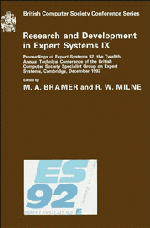Book contents
- Frontmatter
- Contents
- Preface
- Introduction
- CONSULTANT: providing advice for the machine learning toolbox
- A methods model for the integration of KBS and conventional information technology
- KBS methodology as a framework for co-operative working
- Project management for the evolutionary development of expert systems
- The specification and development of rule-based expert systems
- Towards a method for multi-agent system design
- Jigsaw: configuring knowledge acquisition tools
- On the relationship between repertory grid and term subsumption knowledge structures: theory practice tools
- Strategy maze: an on-line tool for support management of the knowledge acquisition process
- Concurrent engineering using collaborating truth maintenance systems
- Ockham's razor as a gardening tool
- A designer's consultant
- Fairness of attribute selection in probabilistic induction
- An application of case-based expert system technology to dynamic job-shop scheduling
- Neural network design via LP
- KEshell2: an intelligent learning data base system
- Approaches to self-explanation and system visibility in the context of application tasks
- An object oriented approach to distributed problem solving
- Intelligent user interface for multiple application systems
- Combining qualitative and quantitative information for temporal reasoning
- Documents as expert systems
KBS methodology as a framework for co-operative working
Published online by Cambridge University Press: 04 August 2010
- Frontmatter
- Contents
- Preface
- Introduction
- CONSULTANT: providing advice for the machine learning toolbox
- A methods model for the integration of KBS and conventional information technology
- KBS methodology as a framework for co-operative working
- Project management for the evolutionary development of expert systems
- The specification and development of rule-based expert systems
- Towards a method for multi-agent system design
- Jigsaw: configuring knowledge acquisition tools
- On the relationship between repertory grid and term subsumption knowledge structures: theory practice tools
- Strategy maze: an on-line tool for support management of the knowledge acquisition process
- Concurrent engineering using collaborating truth maintenance systems
- Ockham's razor as a gardening tool
- A designer's consultant
- Fairness of attribute selection in probabilistic induction
- An application of case-based expert system technology to dynamic job-shop scheduling
- Neural network design via LP
- KEshell2: an intelligent learning data base system
- Approaches to self-explanation and system visibility in the context of application tasks
- An object oriented approach to distributed problem solving
- Intelligent user interface for multiple application systems
- Combining qualitative and quantitative information for temporal reasoning
- Documents as expert systems
Summary
Abstract
This paper describes the development of the Injection Moulding Process Expert System (IMPRESS). The IMPRESS system diagnoses faults in injection moulding machinery which lead to dirt or other contamination appearing in the plastic mouldings which are produced. This KBS has recently been put into use at Plastic Engineers (Scotland) Ltd, and is proving useful both as an expert assistant when technical help is otherwise unavailable, and as a training aid.
The IMPRESS system was built by a member of Plastic Engineers' staff with assistance from a KBS consultant. It was decided that the project would be based around a KBS methodology; a ‘pragmatic’ version of the KADS methodology was chosen. The methodology was used not only to formalise and guide the development of the KBS itself, but also to act as a framework for dividing the work between the two members of the project team. By gaining an understanding of the methodology, the staff member from Plastic Engineers was able to understand the knowledge analysis and KBS design documents produced by the consultant, and to use these documents to implement part of the KBS, both during the development of the system and when system maintenance was required.
The use of a methodology for this project on this project had both benefits and weaknesses, which are discussed at the end of the paper.
Introduction
In January 1992, Plastic Engineers (Scotland) Ltd obtained funding from Scottish Enterprise to help them in the development of a knowledge based system (KBS) for fault diagnosis.
- Type
- Chapter
- Information
- Research and Development in Expert Systems IX , pp. 45 - 60Publisher: Cambridge University PressPrint publication year: 1993

